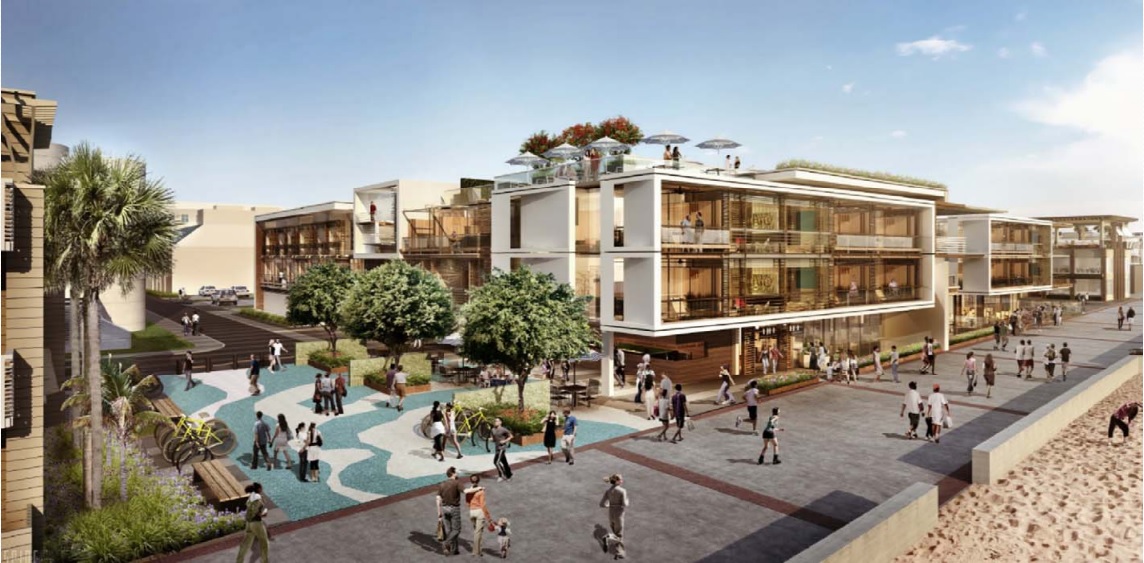
The Strand and Pier Hotel in downtown Hermosa Beach is on hold, according to a letter from the developer to the city.
The Oct. 10 letter from project developer Bolour and Associates to Community Development Director Ken Robertson said the project no longer penciled out for its investors.
“Unfortunately, escalating construction costs, coupled with outdated and excessive parking requirements from the city, and additional financial requirements placed on the developer through the [Environmental Impact Report] process, no longer make this project financially viable,” read the letter from Mark Bolour, the firm’s CEO.
In a statement in response to the letter, City Manager Suja Lowenthal said that the city was disappointed in the developer’s decision, but that “delays are not unusual in projects that are this important, this complex, and in such a prominent location.”
“Delays, like this one, give developers time to marshal the needed resources, and for requirements, such as the ones for parking, to evolve in response to changing demands. As a city, we periodically reevaluate our requirements for existing and proposed projects to ensure that they are in line with the community’s current and future needs. We will continue to do so and, when Bolour is ready, we look forward to continuing to work with it on the environmental review process,” Lowenthal said.
Although the city’s response characterized the decision as a pause, rather than the end of Strand and Pier, Bolour’s letter leaves the project’s fate unclear. The letter said “delays this project has suffered” have “resulted in severe deal fatigue from our investors,” and that the developer needed to “internally reevaluate to determine if there is a feasible path forward.”
Representatives of Bolour and 360, a Culver City firm assisting the developer in the planning process, did not return requests for further comment.
Bolour began acquiring the property in the area of more than six years ago, when it was sold by Diana Alberagate. Albergate’s stepfather, Quentin L. “Boots” Thelen, who died in 2007, had owned the Mermaid bar and some of the surrounding land for six decades. Other properties, including the former West Bay apartments, filled out the proposal site.
Along with other Bolour-owned properties in downtown Hermosa, The Strand and Pier Holding Company owns at least seven parcels at the northwest corner of Pier Plaza that would have been part of the hotel-and-retail development and are now occupied by a variety of tenants operating with the possibility of displacement in coming years. Kathy Knoll, owner of The Deck, a bar on The Strand that is right in the middle of the proposed development, said that she began hearing about potential delays in from Bolour representatives over the summer. But, as of Tuesday morning, she said she had received no formal notice about the delay from her landlord.
“I actually thought that the hotel would be a good thing for Hermosa,” Knoll said. “But I’m happy to be sticking around.”
A draft version of the EIR for the proposal was released in August 2018, and the city’s Planning Commission conducted a hearing for the project in October of last year. A timeline for the project posted on the city’s website puts the project in the phase of preparing responses to comments on the draft EIR, and calls for a vote by the City Council on whether to approve the proposed project in “Spring/Summer 2019.”
The Strand and Pier proposal consisted of a 100-room hotel and accompanying retail outlets. The draft EIR highlighted a variety of challenges facing the project, including a daunting construction process that called for freezing the groundwater below the project in order to erect its foundation, and the removal of enough soil to fill 13 Olympic-size swimming pools to make way for an underground parking garage. But in public statements, developer representatives had expressed optimism about making the process work for residents. Members of the City Council, without endorsing the project, said that it could boost off-season economic activity for small businesses in the city’s downtown.
The scope of the project, however, also produced blowback.
The latest version of the project proposal called for the city to “vacate” two public rights-of-way on Beach Drive and 13th Court that would be incorporated into the project. Doing so would require a separate vote by the City Council. Some residents viewed the vacatings as an unacceptable giveaway and a threat to the city’s character. In April, at a local issues forum hosted by Leadership Hermosa Beach, several people asked Adam Eisenberg, vice president of development for Bolour and Associates, why the proposal called for using the two streets; Eisenberg replied that the project would not make sense financially if the city did not vacate the streets.
Parking also became an issue. Hermosa Beach’s municipal code includes a formula that determines how many parking spaces a given development will be required to provide, based on square footage, the type of use, and the area of town where the project is located. Under this formula, Strand and Pier would have been required to provide as many as 472 parking spaces.
Providing that many would have been impossible within the confines of the project. The relatively high groundwater table of the beach-adjacent land had already created difficulties associated with the two levels of subterranean parking the project called for.
Instead, Bolour was relying on another portion of the code, which allows the city’s planning commission to approve a “parking plan” for a development with fewer spaces than would otherwise be required. Doing so requires the applicant to submit “information necessary to show that adequate parking will be provided” for all who would need it. As is common practice, the developer met this requirement by submitting a shared parking analysis, which was completed in July 2017. The analysis looked at existing car, bike and pedestrian travel patterns for the area, and concluded that Strand and Pier would need approximately 189 parking spaces during the week, and 200 on weekends; the project proposed creating 223 spaces, 178 of which would be below ground and valet-only. The analysis attributed the difference between the amount produced by the square-footage formula and the need it forecasted in part to the code’s failure to account for “the biggest changes in the use of the automobile in 60 years or more,” particularly the rise of ride-hailing services like Lyft and Uber.
Since the meeting last October, city staff and elected officials have given no public indication about their receptiveness to the conclusions of the parking study. The criticisms of parking methodology contained in Bolour’s letter, as well as Lowenthal’s response, suggest that parking likely remained a sticking point.
“Decisions we make today must serve the public’s needs for decades in the future. Before we change our parking requirements to respond to the rise in ride-sharing, we must be certain that the current shift to ride-sharing is a permanent one that will indeed reduce the future need for parking for any proposed project,” Lowenthal said.
The pressure to reexamine the city’s parking regulations has been evident recently even apart from the criticisms offered by Bolour. At its most recent meeting, the City Council voted 3-1 to overturn the Planning Commission’s rejection of a six-unit hotel two blocks away from Strand and Pier. The developer had offered a novel parking strategy, including two tandem spots, that commissioners worried would not adequately address the demand the hotel created. But the council okayed the project, citing in part a recent study conducted for the Beach House, Strand and Pier’s neighbor to the north, which found that more than a third of guests over the past year arrived at the hotel using ride-hailing services.
Plans for Strand and Pier have called for retaining Hermosa Cyclery, a business within the current proposal footprint, as one of the featured retail outlets. The project has been eager to show its commitment to offering bikes and bike racks for environmental reasons, as well as to bolster its argument about needing fewer parking spaces. Like Knoll of the Deck, Steve Collins, co-owner of Hermosa Cyclery, had heard rumors about delays to the project, but has not received any formal notice.
Collins, who has worked at Hermosa Cyclery for four decades, recalled that “this is not the first hotel” pitched in the area. A previous proposal “had us holding our breath and biting our nails.” The experience was repeated all over again when Bolour bought the building, but Collins said that the developer “has been really good to us” as a landlord.
Development dreams are a given in a location as desirable to developers as the one Hermosa Cyclery occupies, Collins said. A new plan may make business owners nervous initially, “but we’ve kind of gotten used to it.”
“We’re happy as we are. But we’d learn to be happy in a new building too,” Collins said.








